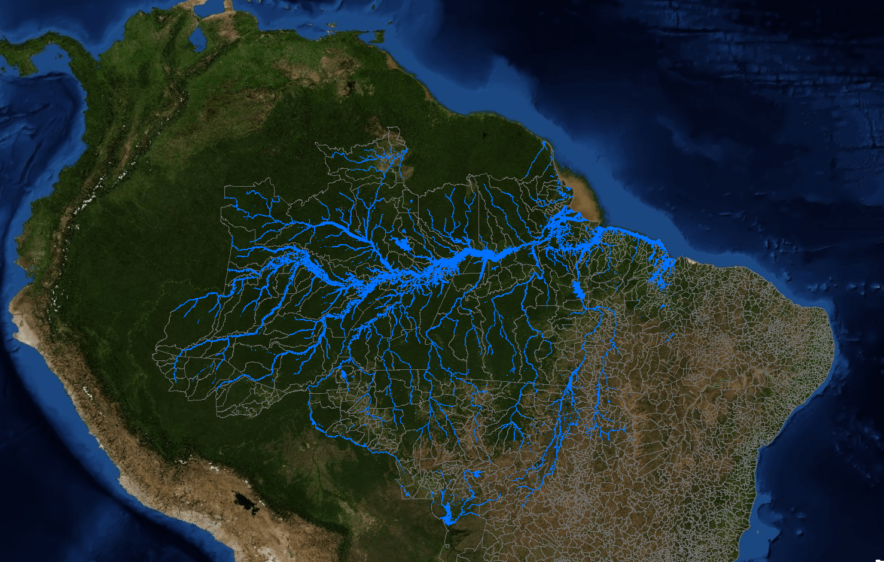By Sérgio Adeodato
Behind the lack of reliable data, a situation that makes it difficult to reconcile economic activities with environmental conservation at the mouth of the Amazon River is the gap in access to resources for science and technology in the region.
The Legal Amazon, with 60% of the Brazilian territory, represents less than 1% of the national expenditures for the sector.
There are 20 masters and doctors per 100,000 inhabitants – half the Brazilian average, according to the National Institute of Industrial Property (INPI).

Amapá (AP) is the state that receives the least investment in scientific research, with 0.1% of the total in the country.
“Such inequality interferes not only in exploratory studies for oil but also for possible renewable sources, such as tidal energy, which in the region registers amplitudes of ten meters, the highest in the country,” attests Valdenira Ferreira dos Santos, a researcher for the Institute for Scientific and Technological Research of Amapá (IEPA).
According to her, the need to reverse the scientific blackout with more investments in strategic territory for Brazil, generating reliable ocean data, is the main lesson of the current debate involving oil in the Amazon.
Despite the agenda of energy transition to low carbon, in the short to medium term, fossil fuels will continue with significant participation in the global energy matrix.
“Besides energy, the oceans provide a series of services and resources for which multiple actors converge, triggering conflicts and challenges for coastal and marine management,” reinforces Santos.
“Today, in the Amazon River mouth basin, totaling 350,000 km², we have no data to say that fishing grounds need to be protected, for example, in case of oil spills from tankers,” she laments.
“The viability of oil exploration in the area will depend on more robust studies of better quality and greater safety to minimize the risks,” says Nils Edvin Asp, an oceanographer at the Federal University of Pará (UFPA).
As an independent consultant, the researcher follows the attempts at environmental licensing in the region over the past decade.
“Unlike other places, basic biodiversity data and ocean dynamics for environmental characterization are lacking,” he says.
Emilio La Rovere, professor of energy planning at the Alberto Luiz Coimbra Institute for Graduate Studies and Engineering Research at the Federal University of Rio de Janeiro (Coppe/UFRJ), reinforces the need for Strategic Environmental Assessment, created in 2012 by the federal government.
“There is no point in running over environmental legislation because there is no point in doing it any old way.”
Besides the image abroad, Brazil’s competitiveness in the sector is at stake. “We need to sell at lower cost and with a smaller environmental footprint, and oil from the Amazon does not fit into this. In the future, there may not be a market for this oil,” he affirms.
In the medium and long term, it makes no sense to destroy the potential of the bio-economy due to oil exploration,” says the researcher.
However, according to analysts, there is also a lack of data on forestry production, Amapá’s economic vocation – largely not included in the country’s economic statistics.
“We can’t lose the opportunity to develop an economy consistent with biodiversity to the detriment of oil,” says Decio Yokota, coordinator of the Indigenous Research and Training Institute (Iepé), which supports extractivist communities in the production and development of markets.
With 74% of its territory covered by tropical forest, almost all of it legally protected, Amapá – from the Tupi language, “place of rain” – owns an expressive source of raw material for the bio-economy as a development vector.
At the same time, its GDP is among the lowest in the country, which leads politicians and business people to defend oil royalties to finance forest production.
If the money were to reach the end, it would work as compensation for dirty energy.
“Investing in forest management, keeping productive areas, is the best strategy to conserve the Amazon Forest and develop the region’s economy, ” says Marcelino Guedes, Embrapa researcher in Macapá (AP).
According to him, Amapá has almost five million hectares of high-production forests with potential for management.
A large part is located in Amapá’s National Forest and the State Forest, open to logging by companies under a concession regime.
With information from Valor
News Brazil, English news Brazil, Brazilian Amazon

